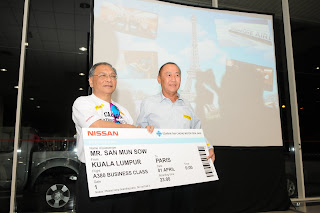The international automotive supplier Continental celebrates its 140th anniversary this year: Since its founding in 1871, the Hanover, Germany-based company has continued to grow. A specialist solely for tires and rubber products at the beginning, it is now a leading global automotive supplier.
"Our customers and business partners profit from our years-long experience, our innovative prowess, our increasingly international orientation and our broadly based product portfolio in different sectors of business," said Dr. Elmar Degenhart, chairman of the Executive Board of Continental AG.
"We are at your side as a competent and reliable partner. At the same time we are a crucial force in shaping today's mega-trends in the automotive industry – safety, information, the environment and affordable vehicles." The 193 Continental locations worldwide plan individual anniversary celebrations for employees and customers.
On October 8, 1871, nine Hanover-based bankers and industrialists founded Continental as a joint stock company under the name "Continental-Caoutchouc & Gutta-Percha Compagnie".
The common stock at the time – around 300,000 thalers – corresponded to a present-day purchasing power equivalent of approximately 6.3 million euros. At the parent plant in Hanover, an initial workforce of around 200 employees made, among other things, soft rubber products – hot water bottles, toy dolls and rubberized fabrics – as well as solid tires for carriages and bicycles.
Sales in the 1880s amounted to roughly 3.3 million marks. In today’s money, that equals a purchasing power of about 21.5 million euros. By way of comparison, the Continental Corporation reported worldwide sales of 26 billion euros in 2010.
At the end of the 1920s, key companies in the German rubber industry merged to form "Continental Gummi-Werke AG". The new company confined its production activities more or less to Germany.
But it exported more and more of what it made. It was not until the 1980s, however, that the company began to rigorously break into international markets. ”In acquiring the European tire operations of the American company Uniroyal Inc., taking over the North American tire manufacturer General Tire, and purchasing majority holdings in the Portuguese company Mabor and the Czech tiremaker Barum, Continental carried its international activities even beyond Europe's borders," noted Degenhart.
Personnel figures document this development: Whereas the 1990 workforce of approximately 51,000 employees was still split up more or less evenly between Germany and the rest of the world, Continental employs over two thirds of its current workforce of roughly 155,000 outside of Germany.
At the end of the 1990s, the Continental Corporation revamped its strategy. This began in 1998 with the purchase of the ITT Industries automotive brake & chassis operations (Teves).
In 2001 Continental acquired the international electronics specialist Temic from Daimler. In doing so, Continental, as a tire and rubber specialist, gave itself a second mainstay in the automotive supplies business. This made the company more immune to business ups and down. The acquisition of Motorola’s automotive electronics business expanded Continental's activities in telematics, and elsewhere.
"With the biggest acquisition to date in the company's history – the takeover of Siemens VDO Automotive AG – Continental advanced to the top league of automotive suppliers globally. In this way, we have simultaneously strengthened our market positions in Europe, North America and Asia”, explains Degenhart.
From the very beginning, Continental disposed of excellent technological competence. In 1904 Continental became the first company anywhere in the world to develop car tires with tread patterns.
Then in 1908 it was also the first with removable rims for touring cars. In 1943 it started producing tubeless tires, the first German company to do so. With its Schwingmetall range of special rubber-to-metal bonded products, launched in 1932, Continental has long provided for vibration- and noise-damping engine suspension.
To this day, Continental actively promotes the development of key technologies and the process of getting them ready for production. In 1998, Continental introduced Electronic Stability Control (ESC) into series production as a pioneering, active safety system.
This year, Continental’s ESC system will enter its fourth generation of production in the form of the
MK 100®. In Germany alone, more than 80 percent of all new vehicles approved are now equipped with ESC systems from various manufacturers.
As far back as 1997, the Continental portfolio already contained hybrid drive technology. In 2009, as first manufacturer anywhere in the world to do so, Continental commenced series production of lithium-ion batteries for use in hybrid vehicles.
The company received the "Idea of the Year 2011" award for its eco-friendly printing blankets. 70 percent less CO2 is emitted in the manufacture of these blankets than is the case in conventional printing blanket production.
The host of initial patents filed each year documents Continental's innovative prowess. In 2011 the company's various groups and divisions will very likely file around 1,100 patent applications.
Around 6,500 employees currently work at the company's parent location in Hanover. In ad-dition to corporate headquarters, the capital city of the German federal state of Lower Saxony is likewise home above all to the three rubber divisions – Passenger and Light Truck (PLT) Tires, Commercial Vehicle (CV) Tires and ContiTech – with administration, R&D and production facilities.
The company develops and tests tires in Hanover. There are also pro-duction facilities there for suspension components like Schwingmetall vibration- and noise-damping engine mounts, drive components such as V-belts, timing belts and V-ribbed belts, and air springs, electronic air spring systems and air spring modules.
With sales of €26 billion in 2010, Continental is among the leading automotive suppliers worldwide. As a supplier of brake systems, systems and components for powertrains and chassis, instrumentation, infotainment solutions, vehicle electronics, tires and technical elastomers, Continental contributes to enhanced driving safety and global climate protection. Continental is also an expert partner in networked automobile communication. Continental currently has approximately 155,000 employees in
45 countries.































